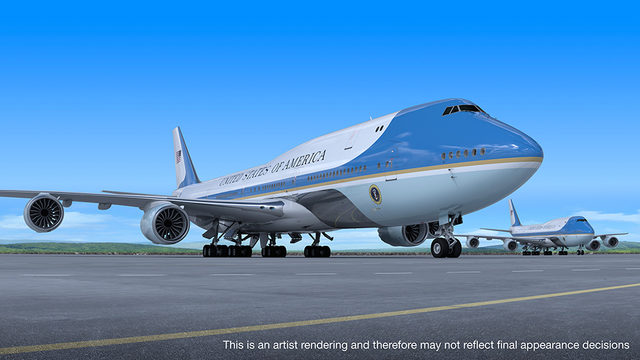Boeing took huge financial hits on its Air Force One and T-7A Advanced Trainer programs for the Air Force in the first quarter of 2022, chalking up the losses to the triple whammy of COVID-related labor problems, inflation, and supply chain issues. Company president and CEO David L. Calhoun also attributed the “messy” quarterly report in large part to the company’s lowballed bids for fixed-price development programs, an approach he said he’ll be avoiding in the future.
Boeing took a loss of $660 million on the Presidential Aircraft Recapitalization (PAR) program, also known as the VC-25B, or “Air Force One,” and a $367 million charge against its T-7A advanced trainer program, for a combined loss of more than $1 billion.
Boeing defense revenues were down 24 percent in the first quarter as the company also suffered a loss on its Navy MQ-25 refueling drone program.
Boeing didn’t report any hits on its KC-46A tanker—another fixed-price development program—on which it already has booked more than $5 billion in losses.
The VC-25B loss was the result of “a public negotiation that happened some time ago,” Calhoun told reporters on a quarterly results call, alluding to former President Donald Trump’s demands for lower costs on the jet that also resulted in one fewer aircraft, the deletion of aerial refueling capability, and the use of pre-owned aircraft for the mission. The VC-25B contract was signed in 2018.
As for Air Force One, “I’m just going to call [it] a very unique moment, a very unique negotiation, a very unique set of risks that Boeing probably shouldn’t have taken,” Calhoun said, “but we are where we are, and we’re going to deliver great airplanes.”
Along with previous losses on the VC-25B, Boeing is now $1.1 billion over its $3.9 billion contract for the two presidential aircraft.
On the fixed-price contracts generally, “We took some risks, not knowing COVID would arise and not knowing the inflationary environment [that] would take hold, like it has,” Calhoun said. “Both of those things have impacted us fairly severely.” He pledged that Boeing will “continue to do our work and deliver first-rate airplanes to our customer in the government.”
While Calhoun was not in charge when the T-7 and MQ-25 fixed-price contracts were signed, he said he was on the board and, “Yes, they were written off the day we took them, knowing that we would be investing a fair amount of our own money in the future of those airframes.”
Nevertheless, he believes “those are going to be really good bets.” Even though development costs are “more than we had anticipated,” the aircraft “don’t go away.” They represent production programs of “many, many airplanes. And I think both airplanes are going to be very successful in supporting our military.”
The inefficiencies in the programs were “predominantly COVID-related,” and that exacts a greater toll on defense programs than commercial ones, Calhoun said.
“In the defense world, when a COVID line goes down or a group of workers steps out, we don’t have a whole bunch of cleared people to step into their shoes. So it has always been a tougher, tougher implication. And for VC-25B, where the clearances are ultra high, it’s really tough.”
Calhoun summed it up that Boeing “just got whacked in a number of different areas” and said the lowballed fixed-price problem is one “that I hope I never contribute to.”
Former Air Force Secretary Heather Wilson said in 2019 that Boeing’s bid for what became the T-7 was nearly $10 billion less than what the service expected to pay. In light of that, Air Force Materiel Command chief Gen. Arnold W. Bunch Jr. said the service might have to change its cost estimating methods—but warned that, first, “you’ve got to see the performance” and whether the actual costs match the bid.
Boeing will roll out the first production example T-7A on April 28.
